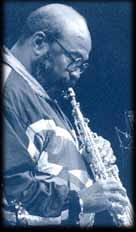
|
|
|
|
|
|
|
James Moody
James Moody is much more than a great musician. Heís warm-hearted, deeply philosophical, and has a wonderful sense of humour. A master on alto, tenor, and soprano saxophones, he also plays flute, composes, and even sings. In Dr. Taylorís words, "He really comes loaded!" Moody is also well-rounded in terms of style, covering ballads, blues, bebop and R&B with equal facility. Playing before a fully-charged audience at the Kennedy Centerís Terrace Theater, Moody jumps right in with Dizzy Gillespieís "Con Alma"--a fitting way to open the show, since Moody began his professional career with Gillespieís band back when he was twenty-one. On several occasions, Moody expresses the tremendous influence Gillespie had and continues to have on him both musically and as a person. According to Moody, his first instrument was a second-hand alto saxophone that his uncle bought him when he was sixteen. He cites Lester Young as an important early influence on sax. He was also influenced by Jimmy Dorsey, Charlie Barnet, Coleman Hawkins, and Don Byas. But it was Youngís melodic style on tenor sax that inspired Moody to learn tenor as well. As Billy puts it, when Young played, "he was singing". Moody says he is glad he followed Youngís style during his early development, as opposed to Hawkinsí approach, which requires playing through frequent key changes. Of course, Moodyís mastery of such technique was sure in coming. With proficiency and ease, he demonstrates these once again with a stellar rendition of Hawkinís "Body and Soul" on soprano sax. Dr. Taylor asks Moody about his hit composition "Iím In the Mood For Love", which he recorded in Sweden in 1949. Moody played the tune on alto sax, and has been praised for his soft and subtle intro. But Moody modestly claims, "I was used to playing it on the tenor...so I was [just] trying to feel my way out...Thatís what that was." Perhaps itís the honesty in his approach that makes the solo sound so magical. At Billyís request, Moody performs a charming vocal rendition of the ballad, singing lyrics by Eddie Jefferson. Perhaps due in part to this experience, Moody explains that he works on playing his entire repertoire on every instrument that he plays. Elaborating in response to a question from the audience, Moody explains the different characteristics of his instruments, including the alto, tenor, and soprano saxophones, and the flute. At one point, Billy asks Moody to describe when first met Charlie Parker. Moody was playing with Dizzyís band at the Persian Hotel Ballroom in Chicago, and Parker stood in as a featured soloist. Moody remembers that he and the other sax players in Gillespieís band were awestruck by Parkerís playing. He goes on to share a little humor about the inspiration for Birdís tune, "Anthropology", then plays a very inspired rendition himself. Responding to more questions from the audience, Moody shares his philosophy on growing musically. He notes that it would take thousands of years to exhaust the possible musical variations using the twelve note chromatic scale. "But you try!", he says, reflecting his unflagging determination to constantly improve as a musician. He also offers his wisdom on sharing oneís best musical ideas with other musicians, noting the mutual benefits when they reciprocate. He says, "Whenever you know something, donít try to hide it. Give it away, because then it comes back to you ten-fold." Moody certainly is generous with his insights, and his own musical offerings. But it isnít only other musicians who benefit, as the audience at the Kennedy Center would attest. Once again, Moody looks to Dizzy for some inspiration, as he closes out the show with a fabulous performance of Gillespieís "Woody ĎN You".
|
|
| |
